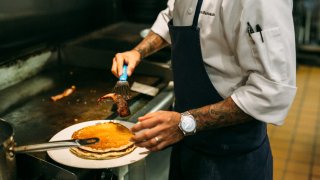
A new study from the University of California, San Francisco suggests that line cooks have the highest risk of mortality during the Covid pandemic — even more than healthcare workers.
For the study, which hasn't been peer-reviewed yet, researchers analyzed California death certificates for working-age people 18 to 65, during the first seven months of the pandemic. Then they looked at how the number of deaths increased in that time frame compared to pre-pandemic times.
Death certificate data includes detailed information about individuals, including their occupation and industry that they held, which allowed the researchers to focus on essential workers, explains Alicia Riley, a sociologist and postdoctoral scholar at the University of California, San Francisco, who co-authored the study.
Overall, the researchers found a 22% increase in mortality during the pandemic. But "what we're so surprised to see is just how much that risk varied across sectors and even across specific jobs," Riley tells CNBC Make It.
Line cooks had a 60% increase in mortality associated with the pandemic.
The top five occupations that had higher than a 50% mortality rate increase during the pandemic include cooks, line workers in warehouses, agricultural workers, bakers and construction laborers.
"What you see on this on this very tragic list of jobs, is that these are low-wage jobs," Riley says. "These are jobs that, especially in California, are held by immigrant workers. And these are jobs where there were not, we weren't paying attention to them." People in these positions may not have the ability to work remotely, take time off if they're sick or get paid sick leave, she says.
Money Report
The risk also varied by race and ethnicity. The study found that "excess mortality," which is the gap between the expected number of deaths in past years and 2020, increased 36% for Latino Californians, 28% for Black Californians and 18% for Asian Californians. Among White working-age Californians, the mortality rate increased by 6% during the pandemic.
Past studies have found that more than half of all Black, Latino and Native American workers hold essential and nonessential jobs that must be done on-site in close proximity with others, a greater share than White workers.
Riley says the hope is that there is more focus on protecting these groups of people who hold high-risk jobs. In California, food and agricultural workers are currently next in line to get vaccinated.
"We've all been touched and supported by the work of these people," she says. "Not only is their labor essential to our lives but their lives are essential."
Covid-19 was the cause of death in about 75% of the death certificates analyzed.
Don't miss: The best credit cards for building credit of 2021






